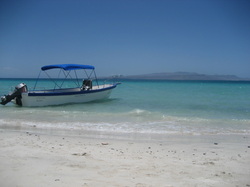
Unfortunately, I can only report a slight improvement. For one, I speak Spanish with what has been described by third-party observers as a distinct Philadelphia accent, similar to the way I speak English. For another, the set of boxed CD's that purports to teach me Spanish is littered with useless phrases rather than the Spanish phrases I really need. I dutifully repeat them anyway. "We are thinking of going to my aunt's house," is something I can say in Spanish (Estamos pensando en ir a la casa de mi tía) Also "I'll take the subway" (Voy en metro).
I have no aunts, and the very small chance I would acquire one, which would require my 93 year-old Uncle Joe to get remarried, is still far larger than the probability of anyone tunneling a subway through the solid rock of Baja California, where my fragments of Spanish are usually employed, in my lifetime, or anytime. Mexico will build a space station first.
The most important word in Spanish for beginners and travelers alike, is "Quiero," which means "I want." Just use this simple word and follow it with the Spanish word for what you want, or the English word for what you want, or just point, and, thanks to the natural friendliness of the Mexican people, or perhaps because they are already sick of listening to you, you will most times get it.
My Significant Other, who accompanies me on these trips, has a beautiful Spanish accent. She can trill her r's like a Latina songbird. Unfortunately, she only knows about twenty words of the language (desafortunadamente, ella solo cononce una veintana de palabras). Last year she startled a waitress by telling her she had an eighty-year old daughter. This year, having mastered the Spanish words for her favorite drink, vodka (vodka) and her favorite back, club soda (Agua mineral) she started ordering her own cocktails. This resulted in her getting back a big glass of vodka and club soda mixed together.
"It's not bad," she said defensively.
"It's one of the nastiest drinks I've ever tasted," I said, after taking an unsolicited sip, with the brutal honesty I am capable of after pounding a couple of cervezas. Proud woman that she is, she wouldn't let me order her drinks even after that. She just added the word "separately" to her Spanish words and made a gesture like she was dividing a pizza with her hands and everybody got it right.
An even more profound problem than speaking Spanish is listening to people speak Spanish to you. Spanish speakers like to talk fast, and they never talk faster than when they are rattling off the price of something you want to buy. Your second most useful phrase after "Quiero" is "Habla despacio por favor," which means "Speak slowly, please." I often follow that with "Soy gringo," which means "I am a white guy." This often draws a laugh, which is what I intended. So some progress there.
Still, two-way conversations can be difficult. But they are not impossible. I got into a hotel elevator that was being cleaned and the maid said to me "Piso?" (Floor?) and I replied easily "Cinco" (Five). She punched the button for the fifth floor without hesitation. I glowed inwardly with pride after this two-word interchange. That elevator was my personal Rosetta Stone.
When I am under pressure or excited, however, even my pitiful Spanish deserts me. One vacation morning near dawn in the seaside village of Loreto I was walking to the docks, where I had an appointment with a panga operator to take me fishing. The water near the docks surged with baitfish popping the surface. We fisherman call phenomenon like this "signs of life." The more active bait there is in the water, the more likely it is you will find hungry fish nearby, ready to be hooked and cooked. I caught sight of my captain. He, too, was excited at the school of fish in the harbor. "Sardines!" he said in English.
"Si," I replied enthusiastically. "Yo soy una sardina!"
I am a sardine.
Hasta la vista, amigos.
Add to: Facebook | Digg | Del.icio.us | Stumbleupon | Reddit | Blinklist | Twitter | Technorati | Yahoo Buzz | Newsvine

 RSS Feed
RSS Feed











